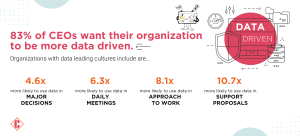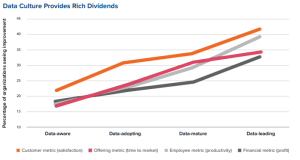Data culture embodies a core set of values, behaviors, and procedural frameworks centered solely on data, elucidating its crucial role in guiding business decisions. This culture revolves around an ethos where data-driven decision-making is ingrained, fostering an organizational understanding of how data directly influences their respective roles. Central to this culture is data literacy, encompassing the capacity to comprehend, manipulate, analyze, and communicate data effectively. Individuals proficient in data literacy discern how to access and employ pertinent data to steer their decision-making.

The significance of a data culture lies in its capacity to empower companies to optimize their data resources. Embracing such a culture enables companies to adeptly gather, monitor, and leverage data to refine decision-making processes. Data becomes a catalyst for augmenting efficiency, uncovering novel prospects, and streamlining operations.
 83% of CEOs believe that data-driven organizations are more successful than those that are not. Data-driven organizations collect and analyze data from various sources, including customer, employee, financial, and market data. This data is used to improve decision-making at all levels of the organization, from strategic planning to day-to-day operations. Organizations realize the true potential of their data when they embody a commitment to data-driven practices across all hierarchical levels and roles. This comprehensive data integration into everyday deliberation defines a data culture’s significance. These cultures curate data in accessible formats, at opportune moments, and with the requisite context, culminating in tangible impacts that elevate key business metrics.
83% of CEOs believe that data-driven organizations are more successful than those that are not. Data-driven organizations collect and analyze data from various sources, including customer, employee, financial, and market data. This data is used to improve decision-making at all levels of the organization, from strategic planning to day-to-day operations. Organizations realize the true potential of their data when they embody a commitment to data-driven practices across all hierarchical levels and roles. This comprehensive data integration into everyday deliberation defines a data culture’s significance. These cultures curate data in accessible formats, at opportune moments, and with the requisite context, culminating in tangible impacts that elevate key business metrics.
Key Trends in Organizations Embracing Strong Data Cultures
Data Culture’s attributes span from tangible elements like training methodologies, available tools, and operational procedures to nuanced, challenging-to-measure traits such as empathy, organizational identity, and confidence in data-related skills. Across a study encompassing 17 distinct characteristics, we discerned five prevalent trends in attitudes and behaviors among respondents categorized within data-leading organizations. While some localization of these trends occurred at the country level, they generally resonated globally. Brazil and India exhibited the most optimistic responses compared to other nations, while Japan, Canada, France, Germany, and the UK reflected comparatively pessimistic inclinations.
1. High Talent Expectations across Diverse Data-Related Activities
Becoming data-driven necessitates a diverse skill set encompassing data sourcing, analysis, interpretation, storytelling through data, and utilizing data for decision-making. Enterprises witnessing a shift towards a data-driven culture often recruit individuals adept in these skills and invest in upskilling their workforce, thus seeing a comprehensive transformation of the entire organization towards a more data-centric approach.
On a global scale, organizations at the forefront of data utilization were thrice as prone to mandate that new hires be able to effectively present data when advocating a viewpoint compared to their data-aware counterparts.
- Asia/Pacific: Disparities were noted, with China and Japan lagging in data analysis skills, while India showcased above-average data literacy investments. On a global scale, merely 3% of organizations reported a lack of employee data-skills training.
- Latin America: Mexico and Brazil reported notable successes in data-literacy investments, especially in analysis, interpretation, and utilization of insights.
- North America: The United States enforced mandatory data-related training for employees more extensively than Canada, especially within data-leading organizations.
- Western Europe: Companies in this region revealed comparatively lower investments in upskilling employees, particularly notable in Germany.
2. Balancing Trust and Accountability
Trust forms the bedrock for establishing a robust culture centered on accessing and leveraging data. It is the linchpin for enterprises to grant their employees access to job-relevant data while fostering confidence in its reliability. Ensuring the right policies and data governance is imperative to facilitate responsible data usage while minimizing barriers to accessing pertinent information.
Read more: How Data Governance Drives Strategic Growth and Value
Data-leading organizations prioritize transparency in data utilization, dismantling barriers between departments and geographic divisions. Consequently, employees within these organizations assume heightened accountability for accessed data, fostering a personal sense of responsibility. These organizations streamline data accessibility, ensuring employees have facilitated access to all necessary data essential for executing their job responsibilities.
- Asia/Pacific: Varied trust levels were observed, impacting data access in China, India, and Japan.
- Latin America: Trust and accountability exhibited lower scores, particularly in Brazil and Mexico, highlighting the need for robust data usage guidelines. According to IDC research in Mexico, only 11% of respondents said they have visibility into company-wide data, and Mexican organizations gave the third-lowest trust scores of all respondents.
- North America: The U.S. and Canada demonstrated higher scores, indicating better access to data among employees in data-leading organizations.
- Western Europe: Trust and accountability ratings were generally above average, with France displaying the most vital scores.
3. Fostering Data Exploration and Curiosity
Possessing tools, technology, and data access doesn’t inherently foster a more data-driven organization. The cultivation of a data-oriented mindset among individuals drives this transformation. Employees within data-leading organizations exhibit a work identity deeply rooted in data, showcasing a willingness to experiment and explore data sets. Interactions within these organizations highlight executives who actively endorse data-driven experimentation and are open to learning from failures, prioritizing the challenging path of data-driven approaches over the easier route.
Strong Data Culture empowers employees to experiment, explore, and innovate with data, fostering an environment where failure is accepted as part of the learning process. Such organizations expect employees to bring data to the table, guiding decision-making away from intuition or guesswork. This ingrains a data-centric approach into the organization’s ethos, where employees take pride in their data proficiency, and data itself becomes integral to the organization’s objectives and strategies.
73.5% of respondents within worldwide data-leading companies affirmed that data consistently guided their decision-making processes. In stark contrast, 5.7% of data-aware organizations reported the same commitment to data-driven decision-making.
- Asia/Pacific: China, Japan, and India noted the varying levels of satisfaction influenced by industry mindsets.
- Latin America: Strong performance in adopting a data-oriented mindset was observed, notably in Mexico and Brazil, influenced by industry segments.
- North America: Fairly average scores were recorded, reflecting industry norms’ influence on mindset.
- Western Europe: Regional variation was evident, with the United Kingdom encouraging data exploration.
4. Collaboration Over Silos
- Asia/Pacific: Varied engagement in in-person and virtual conferences across India, China, and Japan.
- Latin America: Strong confidence in colleague support for data-related queries, augmented by office-hour programs. In Latin America, particularly in Brazil, 98% of respondents, and in Mexico, 94% of respondents echoed this high confidence level.
- North America: Significant investments in community-building activities, differing preferences between the U.S. and Canada.
- Western Europe: Emphasis on support programs for data and analytics, especially in France, Germany, and the United Kingdom.
5. Commitment to Deriving Value from Data
Referencing the IDC InfoBrief, the findings revealed a progressive correlation between an organization’s position on the Data Culture index and its performance on standard business metrics. While most organizations aspire to prioritize data-driven decision-making, the ones that achieve success are those where leaders earnestly invest in the necessary resources. These investments encompass people, processes, and technology essential for implementing and embracing data and analytics at a comprehensive scale.
IDC studies reveal that businesses prioritizing data-driven strategies experience a significant 6% increase in profitability and a 5% improvement in productivity compared to those who rely on intuition and gut feeling.

Statistics further highlight the growing importance of diverse data sources in driving business growth. Customer data reigns supreme, contributing 45% of annual revenue and offering data at 35%. Employee data (25%) and financial data (20%) also provide valuable insights for strategic decision-making.
Across various geographical regions, there existed a substantial 46.2% variance between data-leading and data-aware organizations concerning their perception of data as an asset and their acknowledgment of the value it yields.
- Asia/Pacific: Varying leadership structures in China, India, and Japan influence data value perceptions.
- Latin America: Brazil and Mexico highlighted differences between leadership priorities and employee perceptions of data value.
- North America: Discrepancies in commitment were noted between the U.S. and Canada, impacting data-value realization efforts.
- Western Europe: Diverse approaches to realizing value from data, ranging from leadership structures to perceptions on data’s asset value, across the United Kingdom, Germany, and France.


